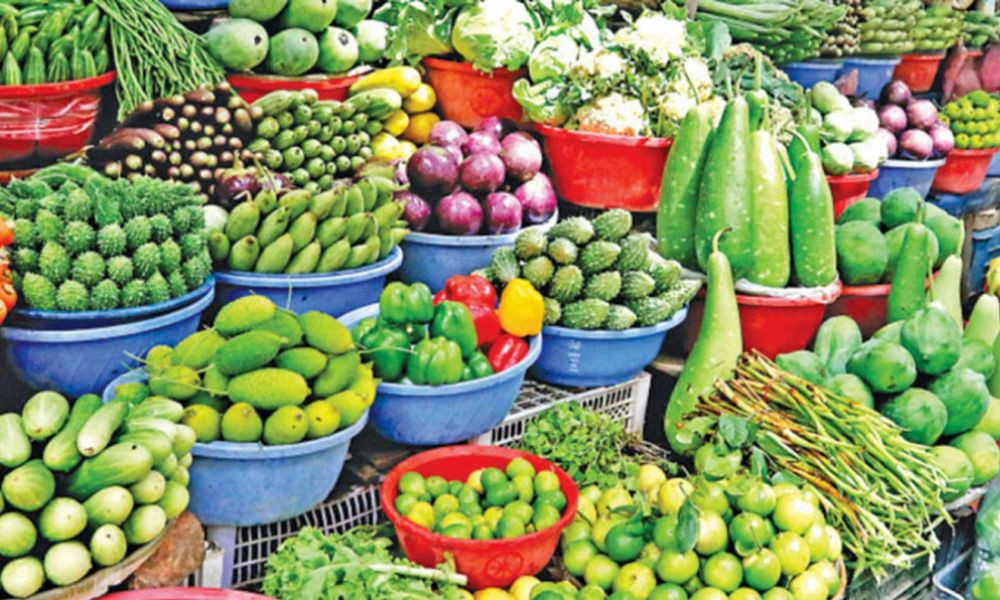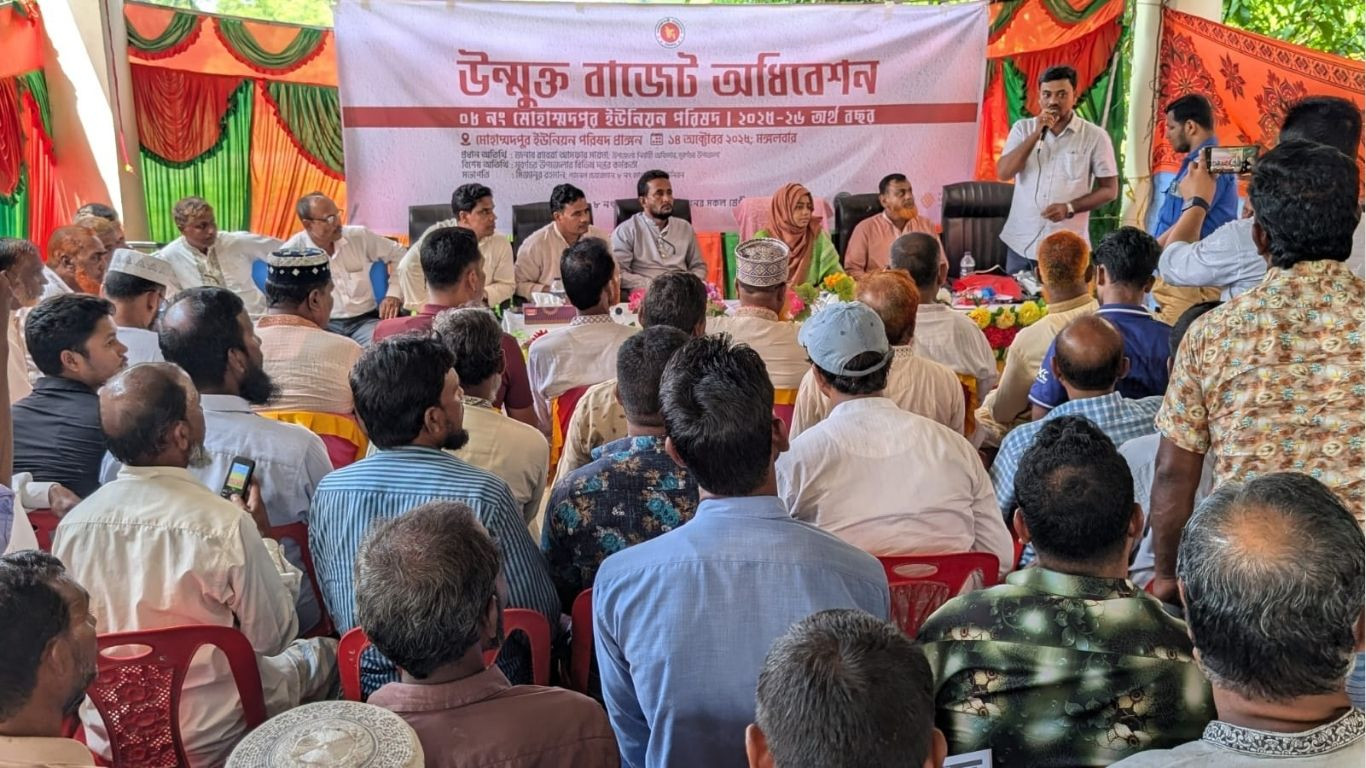.jpg)
Middlemen cause vegetable prices to soar fourfold

Bangla Press Desk: By the time vegetables move from farmers to retail markets in the capital, their prices increase by almost four times. This sharp rise is driven by multiple middlemen, extortion, and inadequate market oversight. Consequently, farmers earn far less than they should, while consumers face excessive prices. Experts say that addressing this issue requires strengthening agricultural marketing both online and offline and improving the overall market structure.
In Bogura’s Mohasthan Market, one of the country’s largest vegetable hubs, farmers are selling eggplants at Tk27 to Tk40 per kilogram depending on quality, and beans at Tk35 to Tk40 per kilogram. However, these vegetables, purchased cheaply from farmers, are sold in Dhaka’s retail markets at four to five times higher prices.
Vegetable prices in the capital are now sky-high. Except for a few items, most vegetables are priced in the hundreds of Taka per kilogram. Due to the high prices, buyers are struggling to balance their income with expenses. Consumers said that vegetables that cost Tk70 to Tk80 per kilogram a few days ago are now being sold at Tk120. If this continues, the general public will face even more hardship.
Market analysis shows that on Wednesday and Thursday, in retail markets of Mohakhali, Badda, Rampura, and Jowarsahara in Dhaka, eggplants were sold at Tk100 to Tk180 per kilogram depending on quality. Meanwhile, in Mohasthan Market, Bogura, farmers sold eggplants wholesale at Tk27 to Tk40 per kilogram. In Pabna, eggplants were sold at Tk60 to Tk70, in Meherpur at Tk70, and in Narsingdi at Tk70 to Tk100 per kilogram.
In the capital, early winter beans are being sold at Tk160 to Tk200 per kilogram, although farmers in Mohasthan Market sell them wholesale at Tk35 to Tk40 per kilogram. Bitter gourd in Dhaka’s retail markets costs Tk100 to Tk120 per kilogram, while in Bogura farmers sell it at Tk32 to Tk38 per kilogram. In Narsingdi, Pabna, and Meherpur wholesale markets, bitter gourd is priced at Tk50 to Tk65 per kilogram.
In the capital, ridge gourd sells at Tk100 to Tk120 per kilogram, while farmers in Mohasthan Market sell it at Tk30 to Tk32 per kilogram. In Narsingdi, Pabna, and Meherpur wholesale markets, the price ranges from Tk50 to Tk75. Pointed gourd in Dhaka sells for Tk70 to Tk 80 per kilogram, while in Bogura farmers sell it for Tk20 to Tk25 per kilogram. In the capital, sponge gourd is sold at Tk90 to Tk100 per kilogram, whereas farmers sell it wholesale at Tk30 to Tk36 per kilogram.
Brinjal in the capital is sold at Tk80 to Tk100 per kilogram, but farmers in Mohasthan Market sell it at Tk20 to Tk25 per kilogram. Similarly, winter pumpkin in Dhaka costs Tk55 to Tk60 per kilogram, while farmers in Bogura sell it for Tk17 to Tk20. Long bottle gourd is sold in Dhaka at Tk70 to Tk80 per piece depending on size. In Mohasthan Market, each piece is sold at Tk15 to Tk25, and in Pabna and Meherpur markets, it is sold at Tk30 to Tk42.
Regarding the price hike due to multiple handovers, vegetable seller Md. Habib from Karwan Bazar told Kaler Kantho, “Farmers first bring their vegetables to local markets. In these local markets, syndicates of brokers or wholesalers set the price collectively. They buy vegetables from farmers by the ‘maund’ at that set price. Later, vegetables are transported to the capital by truck or pickup. In Dhaka, after several handovers, they finally reach retail sellers. Through these handovers, vegetable prices increase.” He added, “If farmers had direct contact with Dhaka sellers, handovers would be reduced, and prices would drop significantly. Both farmers and consumers would benefit.”
Shahidul Islam, a farmer and vegetable seller from Bogura’s Baghpara area, told Kaler Kantho, “This year, continuous rainfall has reduced vegetable production. We farmers do not get fair prices. The government and the agriculture office do not even take notice. After spending so much money, if we don’t get proper prices for our produce, how will we run our households?”
Farmers said that middlemen or traders earn Tk15 to Tk20 profit per kilogram of vegetables. Additionally, for each piece of long bottle gourd, they earn Tk15 to Tk25. At retail level, depending on the market and location, this effect can double to quadruple.
Sohel Md. Shamsuddin Firoz, Deputy Director (Agriculture) of Bogura’s Department of Agricultural Extension, told Kaler Kantho, “Marginal farmers are almost always deprived. The Department of Agricultural Extension has formed ‘farmer groups’ to support production and advisory services, and agricultural marketing also needs to be organized in groups to ensure fair prices for farmers. Agricultural marketing must be strengthened both online and offline, and the market system must be made robust.”
Regarding consumer interests, Md. Khalilur Rahman Sojal, Executive Director of Voluntary Consumers Training and Awareness Society (VOCTA), told Kaler Kantho, “Even if city consumers buy farmers’ produce at high prices, farmers do not get fair value. An invisible but very powerful group, known as middlemen, inflate prices in the market.”
He said, “Vegetables sold at Tk80 to Tk100 per kilogram in Dhaka are purchased by farmers in their local markets for only Tk20 to Tk25. This disparity is not only visible but also proven by research. For vegetables and grains, middlemen earn 50 to 65 percent profit, meaning farmers do not even recover their labor and production costs. Meanwhile, city consumers are forced to pay excess prices. The main cause of this disparity is structural weakness in the market system. The chain from farmer to consumer is long and complex.”
Khalilur Rahman Sojal added, “In our current market system, products go from farmer to wholesaler and middlemen, then to retail sellers, and finally to consumers. At each stage, farmers’ rightful earnings are cut. Middlemen set high prices between farmers and consumers, buying at low cost and selling at high prices. Farmers’ income is less than half, while middlemen earn two to three times profit. Lack of transport and storage infrastructure also prevents farmers from getting fair prices.”
Agricultural economist Dr. Jahangir Alam Khan told Kaler Kantho, “The main problem in our marketing system is that farmers do not get fair prices, and consumers pay excess prices. The current system benefits middlemen at the expense of both farmers and consumers. If the market system is adjusted in favor of farmers, both farmers and consumers will benefit. Without middlemen exploiting the system, farmers will receive fair prices, and consumers can buy at reasonable rates.”
BP/SP
YOU MAY ALSO LIKE
.jpg)



Tk5.68cr budget announced at open budget session in Noakhali


